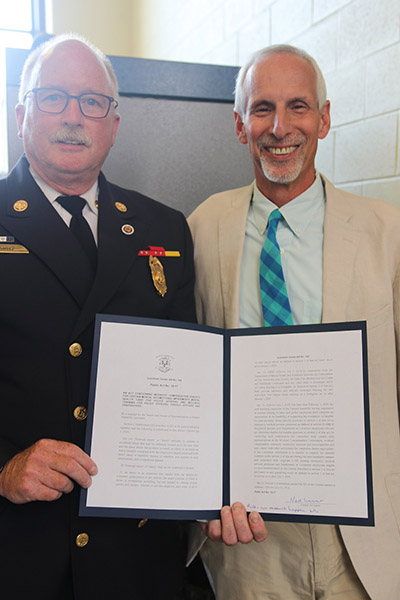Sen. Needleman Stands With Leaders as Governor Signs Bill Expanding PTSD Treatment for First Responders

State Senator Norm Needleman stands with Richard Hart, Deputy Chief of the City of Waterbury Fire Department and Connecticut Director of Legislative and Political Affairs for the Uniformed Professional Firefighters of America, after Governor Ned Lamont signed a bill allowing medical coverage for post-traumatic stress disorder for first responders.
WATERBURY – Today, State Senator Norm Needleman (D-Essex) joined Governor Ned Lamont and a number of state officials, political leaders and first responders to commemorate Lamont’s signing of a bill expanding treatment for post-traumatic stress disorder to first responders including police officers and firefighters. Under the new law, these first responders will have the ability to seek treatment after witnessing or experiencing traumatic incidents while on the job.
“Our first responders make sacrifices to protect our safety, and in doing so, they must often face tragedy and trauma,” said Sen. Needleman. “Those scenes can linger and last long after they end, causing significant mental stress and trauma that can negatively impact their lives and the lives of their families and friends. Many first responders refuse to seek help because they fear they will be treated differently. Today, we’re extending them a helping hand, letting them know that we know they are in pain and that we are willing to help. My only regret is that the legislation does not include EMS workers, as the negotiations leading to this bill were intricate and complicated, but I am confident that we can change that in the General Assembly next year and provide them the assistance they need.”
With the bill signed by Governor Lamont today, first responders who experience traumatic incidents in the line of duty would be authorized to receive medical benefits if they are diagnosed with post-traumatic stress disorder. The new law also expands the evaluation period for an employer to accept or deny such a claim from 30 days to 180 days. Due to negotiations between unions and municipalities in the creation of the law, it does not currently include coverage for emergency medical services workers and Department of Corrections officers, but a late addition to the bill includes a study of expanding the care to those individuals to be completed by the end of 2019. Lawmakers will have the opportunity to create a similar law covering those workers in the 2020 legislative session.
The new standards are expected to provide coverage to roughly 36,000 state and local employees, including 26,800 firefighters, 8,180 police officers, 958 state police officers and 140 parole officers.
Share this page:
